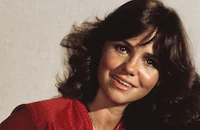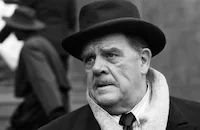Things started turning around when Joanne Woodward insisted she be given an audition for the title role in the two-part television movie Sybil in 1976. She won an Emmy as a woman with 16 personalities in a performance that finally made people notice how good she was. It took a while, however, for that credit to extend to film work. After an un-credited walk on in Disney's Moon Pilot (1962), Field had made her official film debut in The Way West (1967), a poorly received Western starring Kirk Douglas. After that, most of her film work was in comedies like Stay Hungry (1976) and Smokey and the Bandit (1977). Though the latter was a big box-office hit, it took her casting in Norma Rae to establish her as a major film star, a position cemented when she won the Oscar® for her work. She would win a second Oscar® for Places in the Heart (1984), a nomination for Lincoln (2012) and two more Emmys, for a guest appearance on ER and the drama series Brothers & Sisters.
The film also marked another major collaboration for director Martin Ritt and husband-and-wife screenwriters Irving Ravetch and Harriet Frank, Jr., marking their sixth of eight films together. Dissecting the American dream seems to have been their primary interest as a writing-directing team, starting with The Long, Hot Summer (1958), a provocative depiction of the modern South. They also took on the decline of the American West in Hud (1963) and Hombre (1967), racial issues in Conrack (1974) and literacy issues with Stanley & Iris (1990), their last film together.
Norma Rae was also one of the first major American films to deal sympathetically with the labor movement. During Hollywood's Golden Age, the union movement was considered too controversial for extensive screen coverage. Although many movies, particularly the women's films of the '30s, dealt with working conditions, unions were treated somewhat more circumspectly. The labor movement in Warner Bros.' Heroes for Sale (1933) is equated with the rise of Communism, while the Oscar®-winning On the Waterfront (1954) focuses on corruption within the dock workers' union and The Pajama Game (1957) reduces labor issues to comedy, albeit very entertainingly. The most sympathetic treatments of the labor movement came in independent films like Salt of the Earth (1954), about a miners' union in New Mexico. Ritt had attempted to provide a more even-handed view of labor disputes with The Molly Maguires (1970), which dealt with the 19th-century battle to unionize coal mines in Pennsylvania. It wasn't until later in the decade, however, that the major studios took a chance on more positive depcitions of labor like Bound for Glory (1976) and Blue Collar (1978). Both of those films offered other points of interest, however, leaving it to Norma Rae to blaze the path for later pro-labor films like John Sayles' Matewan (1987), Hoffa (1992), starring Jack Nicholson as the famous union organizer, and Robert Townsend's 10,000 Black Men Named George (2002).
Ritt was inspired to make the film when he read a New York Times article about the real life efforts of Crystal Lee Sutton and union organizer Eli Zivkovich to unionize workers at the J.P. Stevens Mill in Roanoke Rapids, NC, and the book on her, Crystal Lee, a Woman of Inheritance, by Henry P. Lieverman. The scene in which Fields holds up a "Union" sign at the plant and another in which she tells her children about their fathers were drawn from Sutton's life. Though Ritt had a great subject, however, most major Hollywood studios wouldn't touch it. Paramount and Columbia declined to make the film, but finally Alan Ladd, Jr. at 20th Century-Fox picked it up, though he only gave Ritt a budget of $4.5 million.
Field was not the first choice for the title role. It was offered first to Marsha Mason, Jane Fonda, Faye Dunaway and Jill Clayburgh, all of whom turned it down. Shirley MacLaine wrote in one of her memoirs that she campaigned heavily to land the role. Ritt had met Field at an anti-nuclear rally, however, and had been impressed by her commitment and intelligence. Nobody at Fox believed she could pull off the performance, but he persisted until he wore them down. He would tell the press, "In my opinion, she's going to be one of Hollywood's biggest stars; she's sexy, funny, photogenic, zany, bouncy and tough -- possibly another Carole Lombard." (Ritt, quoted in Mason Wiley and Damien Bona, Inside Oscar®: The Unofficial History of the Academy Awards®)
To research the role, Field worked in a textile factory alongside co-star Beau Bridges, who played her husband. Her commitment to the role impressed everybody, particularly an actor playing a policeman trying to arrest her. She struggled so hard to keep them from loading her into a police car, she broke one of his ribs.
Ritt wanted to shoot the film in Georgia, but when word got around that he was making a pro-union film in the right-to-work state, no factory owners would allow him to film on their property. At the time, Governor George Wallace was trying to attract film production to Alabama, and he used his considerable influence to help Ritt secure shooting permits in Auburn, Opelika and Waverly. Even with the governor's suppport, Ritt had trouble finding a mill in which to shoot, eventually paying $100,000 to secure a location.
Norma Rae opened to strong reviews and good box office. Variety praised the picture as "an intelligent film with heart" and pointed out that union films rarely did well at the box office. Vincent Canby of the New York Times hailed Field for her performance in "the plum role of her career, an opportunity to demonstrate once and for all that she is an actress of dramatic intelligence and force, someone who no longer needs to be referred to in terms of her television credits." Eventually the picture grossed $22 million in the U.S. More important than any reviews, however, were the letters of thanks Ritt received from union leaders grateful to see the cause of organized labor so sympathetically represented.
Field's triumph was cemented during awards season, when she was named best actress by the Golden Globes, the American Movie Awards, the Cannes Film Festival, the Kansas City Film Critics, the Los Angeles Film Critics Association, the National Board of Review, the National Society of Film Critics and the New York Film Critics Circle. The big pay-off, of course, was the Academy Awards®, where she won her first Oscar® for Best Actress. As thrilled as she was to win the award, she couldn't help riffing on her earlier career when she told the press, "I do feel like the Academy® is slacking off in the class quotient -- after all, I won. It's like the Groucho Marx line about I wouldn't want to be in a club that would have me as a member." (Field, quoted in Wiley and Bona) The film also won Best Song for "It Goes Like It Goes" and was nominated for Best Picture and Best Adapted Screenplay.
FUN FACTS FOR THE FILM BUFF on NORMA RAE (1979)
- The mill in which they shot many key scenes was so noisy, director Martin Ritt couldn't hear the actors' lines. Fortuantely, he knew the script so well after working closely with screenwriters Irving Ravetch and Harriet Frank, Jr. that he could direct the scenes just by watching.
- Students from Auburn University appeared as extras, while the casting director drew on talent pools throughout the South for smaller roles. Among those cast were Grace Zabriskie, at the time based in Atlanta, who would build a solid career as a character actress in films like The Big Easy (1986) and Drugstore Cowboy (1989) and the TV series Twin Peaks and Big Love.
- This was the first film soundtrack to feature a vocal by Jennifer Warnes, who sang the Oscar®-winning "It Goes Like It Goes." She would go on to introduce two other Best Song-winners, "Up Where We Belong" from An Officer and a Gentleman (1982) and "The Time of My Life" from Dirty Dancing (1987), along with the Oscar®-nominated "One More Hour" from Ragtime (1981)
- Ritt appears in a brief cameo as an unhappy textile worker.
- One person unhappy with Norma Rae was its inspiration,Crystal Lee Sutton. She felt the film would have worked better as a documentary.
- Two years after the film's release, Cassie Yates took over the title role in a TV movie of the same name, co-starring Gary Frank as the union organizer and Barry Corbin as Norma Rae's father..






























